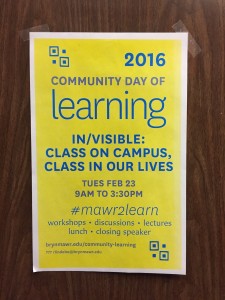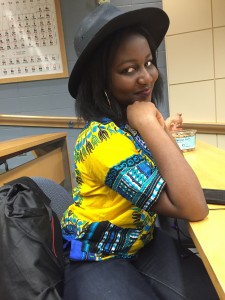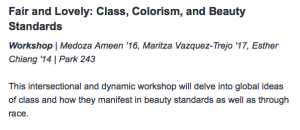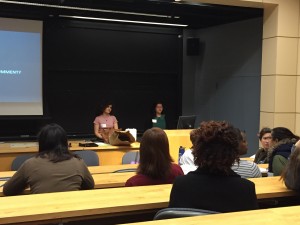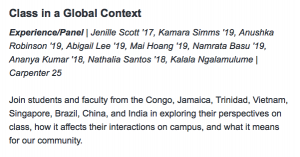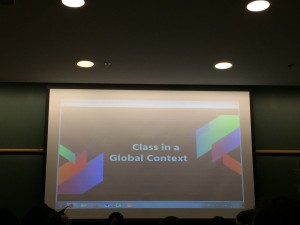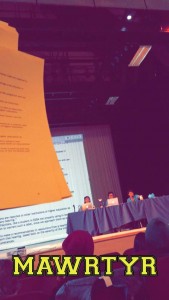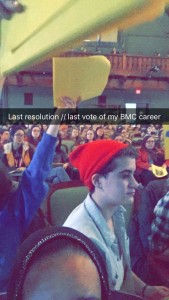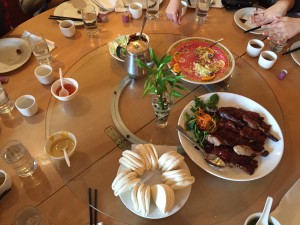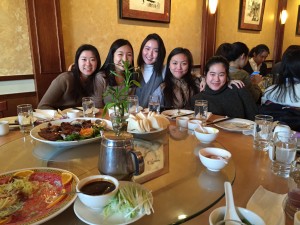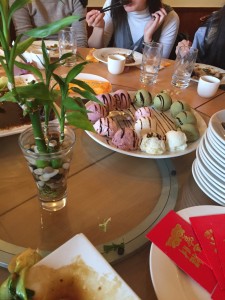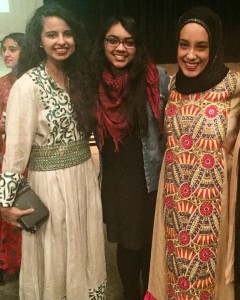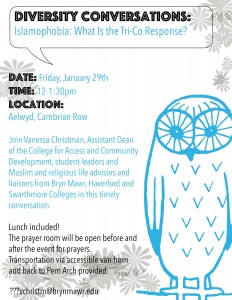This post is coming following the Steven Salaita talk, which discussed academic freedom. If anyone isn’t familiar with who Salaita is, a quick refresher here is a good idea, but I will say that his background is not incredibly important to what I’ve written, but that it might help you to know where I am coming from.
Steven Salaita discusses academic freedom in regards to his own case. He talks about how placing punishment in the hands of people who are administratively above us, that by placing problems within the hands of the administration, to discuss what does and does not constitute a fireable offense, is wrong. It is harmful to all of us, to be part of that oppressive system and that, in the end, essentially, it will only serve to kick us in the ass.
This blog post was going to be very different when I was sitting in Carpenter listening to him talk. I was going to talk about freedom of speech and how it has affected my time here at Bryn Mawr. I wanted to discuss the fact that when I first told my mother that I participated in the student march we had last year, that my mother asked me to be safe, and wary. That I’ve voluntarily started a new Twitter account because I thought my previous one would be rather inflammatory if I ever wanted to be employed in the US. I, too, you see, had some thoughts about the Gaza attacks that may not have endeared me to a lot of the systems of power. There are multiple incidents that I had wanted to discuss in that blog post, and maybe still will. But, the more I thought about what Steven Salaita had to say, the more I kept thinking about the systems of power and what they gain from concealing people’s views and keeping them hidden. What these perpetrators gain from that is keeping everyone mildly sedated, quiet, and no one is quite sure if they’re allowed to speak up or not.
I agree with Salaita on multiple fronts. However, I am also a member of what continually feels like an administration-run board that infringes on others’ freedoms. Here, I am speaking about my personal position on the Bryn Mawr Honor Board.
A bit of my own background: I decided to be a member of the honor board for multiple reasons. Some are superficial. For example, I wanted to be a member of the Student Governance Association. I have held positions in clubs for the past few years and, while I did not want to be a part of a club again, I still wanted to be part of a student body–I have always enjoyed that aspect of my Bryn Mawr experience. I also wanted to understand the honor code a little more. I had my own personal views about it, I had my own not-so-great experiences with it, and I wanted to explore them through my position on the honor board.
I did become a member of the honor board for the 2015-2016 academic school year. Since then, I have become increasingly disappointed and disillusioned with honor board proceedings, and more importantly, with the idea of confrontation (which I will elaborate on further in this article). Honor board hearings are closed, the events that occur during those hearings are not discussed outside the hearings and not with anyone who is not present in those hearings. That, to me, is counterintuitive. Sometimes, a hearing occurs because we want to right a wrong, we want to fix something that may have impacted several students. The secrecy prevents that. I understand the need for confidentiality and protecting the students’ right to privacy. But if a student is removed from a leadership position due to their hearing, if they are forced to drop a class, or are expelled… then the cat’s out of the bag isn’t it? The honor board hearing is only serving its own self importance. The honor board, instead of dispelling fear, which we as members sometimes discuss with the community, holding events in order to get people more comfortable with the honor code and honor board process, in fact operates on the fear of the honor board. How is the honor code upheld? By fearing the consequences. By fearing the hearings. The honor code needs us to be scared of the honor code, which has become an administrative-run institution of its own.
The other problem, which Salaita brings up, is elitism, which can also be translated into inaccessibility. There was an honor board resolution in this year’s plenary that drew a lot of “controversy”. The honor board was trying to pass the following Resolution 2 on the 2016 Spring Plenary, entitled “Waiving the Requirement of Minutes in Honor Board Hearings”. During the following debate, many things became clear: a) that people did not understand how the honor board operates, which I also understand, because the reason I wanted to join the honor board in the first place is because I myself did not understand it, and b) that people did not understand the honor code either, that there are parts of it that are muddled and confusing and un-transparent, on purpose, which is part of its charm, or so we think. However, that muddiness makes it even less accessible to students, to faculty, and more importantly, to the people who run into an conflict with the honor code, the people who get the scary emails to “please go see their deans”, the people who get the email that their grades have been withheld for this semester for no reason. There are things that I have heard during some honor board hearings that have made me beyond uncomfortable, from people who were serving as members of the “judging” process, things that I feel I cannot share here because of that fear of betraying confidentiality that has been ingrained in me.
During Plenary, there were people (who were opposed to passing the resolution) who openly said, “I’ve never read the honor code, but [such and such] are my thoughts on how it should be changed”. I do not need to point out that this is not a very good way to start a discussion nor is it a very good way to instigate change on campus. And that is part of the problem that the honor code runs into: people don’t really care about it. The honor code is a mythical part of our campus, it is part of what Bryn Mawr has been built on and it is such an entrenched aspect of our campus that we don’t think about what it really means and how it affects our school. The Honor Code is deeply rooted in Bryn Mawr, and we ignore what it stands for. We’ve have stopped considering how it affects student self governance when we have deans on the board, and when we have more faculty during an honor board meetings than students. When, due to the differences in station, students feel understandably nervous to voice their thoughts in front of professors. Because while, theoretically, we are all level during an honor board hearing, there are still differences in station, in position, that will lead us to think that a professor or a dean probably has a better idea than we do, that they are the proper authority.
During his talk, Salaita draws similarities between an American colonial history, and how he believes that part of the reason he was fired, is because of issues within the department that he is in, as a Native studies scholar, and that tensions already brewing. If you draw similarities between that American colonial history, and to the many issues students have with Bryn Mawr’s own history, and how we grapple with it, we can add the honor code and self governance, both of which we consider pillars of Bryn Mawr that have (almost) been a part of the college since it started, as part of the reason that we, as students, do not feel completely safe nor welcome at school. We cannot always state our mind, or talk to our friends, because there is a mythical, ever-present ~ honor code ~ that prevents it. This honor code is full of inaccessible language, hard to determine, and with an invisible line that you’re never quite sure if you’re crossing.
But I am jumping ahead of myself here! The first step of an honor board hearing is confrontation, a core tenet of the honor code as well as of Bryn Mawr. We’ve heard it all: confrontation is not scary, it is a core part of your Bryn Mawr experience, and that nothing would get settled unless we confront others and instigate that change. That is all well and true, in theory. In action, confrontation is a dreaded part of anybody’s experience at Bryn Mawr, and even when it is done, it is barely done right. We’ve had experiences where “confrontation” has been done through someone calling public safety rather than asking a student next door to stop smoking, or when someone goes to their HA to talk to their roommate rather than talking to them, or, or, or. This is a small campus and I am sure everyone has their own confrontation mishaps. And that’s natural! It IS intimidating to talk to people, especially if it is a big group of people and ask them to stop doing something. That is true, but that is what Bryn Mawr asks of you. We expect people to come into Bryn Mawr already having the skills that some students, seniors who are leaving school in a few months, still don’t possess. The fact is, not everyone is comfortable with confrontation, not everyone is ready for it, and our assumption that people will be comfortable with confrontation at Bryn Mawr is both ridiculous and untrue.
Confrontation is scary and intimidating. You feel like you’re burning bridges with people. If you have anxiety, that anxiety doubles and then it triples. We are asked to treat people like an adult as soon as they step foot on campus, we ask them to be able to confront and we ask them to be able to articulate, forgetting how sincerely classist and elitist that idea is, forgetting that there are different classes, whether socio-economic classes, or class years, that seem to carry more weight, and make the balances tilt in another’s favor, especially when you’re thinking of confronting that party.
I hope that my arguments, at times, made sense. In truth, I don’t know where I stand when it comes to the honor board/code. I am both for it, and against it. I both think that it is necessary, and that it requires a lot of reframing and reforming before it is ready again. That’s how I stand with so much of what occurs on campus. When it comes to WTF Week, when it comes to discussions about trigger warnings and safety, I wish there was more change happenings and that more of it was being led by students who were equally a part of administrative proceedings. And I wish, so much, that the fact that people will have different ideas is respected in Bryn Mawr (it is not, do not tell me it is) and that people who struggle with framing ideas, who do not have the same language that is seemingly expected from someone in order to be able to carry a discussion (an elitist idea) is abolished.
Please post your thoughts because I would love to hear them.




